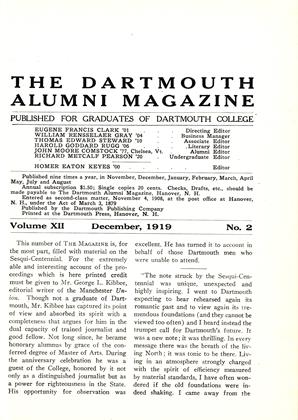The following is from the BostonHerald:
President Hopkins of Dartmouth faced the future yesterday in a notable address in connection with the celebration of the sesqui-centennial of the founding of the college. Naturally enough there was much said during the week about the ISO years of Dartmouth’s past, but it was fitting for the head of the college to dwell mainly on the opportunities and obligations that lie ahead; and he dwelt on them with a clearness and vigor that will challenge wide attention in the educational world. It is probable that some will consider his point of view so unconventional as to be heretical.
He argues, for example, that the selective processes for admission to the respective kinds of colleges, variously conditioned and vari- ously located, should be better devised for de- termining characteristics likely to be most benefited by the respective attributes of the college in question. That is, he sees the work of Dartmouth—and presumably that of our other historic, and formerly small and iso- lated, colleges—to be quite apart from that of the state-endowed institutions and those in great centres, and even more apart from that of the college maintained as the undergraduate department and feeder for the university. He regards it as the first obligation of such a college as Dartmouth to level up the mass of the group which it accepts “rather than to give sole consideration to a refined process of dis- tillation.”
He would give more attention to the product and less to the delicacy and polish of the ma- chinery. He would seek primarily to develop intelligent men, not intellectual men. And he would make teaching ability—not success in research or production—the first test of the college professor. He feels that our colleges have suffered untold injury by accepting fac- ulty standards from the graduate schools, which, in turn, took the standards from abroad where the problems faced were utterly differ- ent. Finally he would keep the historic col- leges true to the religious impulses of which they are the products, but he would translate those impulses into the terms of our life today —translating Eleazar Wheelock’s altruistic purpose of converting the heathen savage to the glory of God into a desire to convert so- ciety to the welfare of man, for, he says “the highest idealism is the purest religion”.
 View Full Issue
View Full Issue
More From This Issue
-
 Article
ArticleTHE SESQUI-CENTENNIAL
December 1919 By George Levi Kibbee -
 Article
ArticleDARTMOUTH COLLEGE: AN ATTEMPT AT FORMAL INTERPRETATION
December 1919 -
 Article
ArticleREPORT OF TRUSTEES MEETING
December 1919 -
 Article
ArticleNEW ENGLAND STATES
December 1919 -
 Article
ArticleThis number of The Magazine
December 1919 -
 Article
ArticleFALL MEETING OF ALUMNI COUNCIL
December 1919 By Homer E. Keyes







